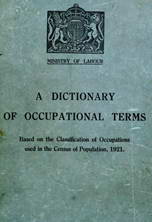A Dictionary of Occupational Terms Based on the Classification of Occupations used in the Census of Population, 1921.

ORDER XXVI.—PERSONS EMPLOYED IN ENTERTAINMENTS AND SPORT
Sub-order 1.—Persons Employed in Entertainments and Sport
886.—Musicians
Back to List of Occupational Codes
- accompanist
- plays, usually on a pianoforte, accompaniment of a song, or of a solo on a violin or other instrument at public entertainments; may also accompany soloist at practice.
- bandmaster
- conducts a band of instrumentalists (q.v.); selects music to be played; rehearses and conducts performance; cf. musical director.
- bandsman
- general term for any member of a band of instrumentalists (q.v.); sometimes specifically designated, e.g. military bandsman.
- bell ringer
- rings bells, usually in churches, either by pulling on a rope or ropes which cause the bells to swing in the belfry, or by playing on a keyboard connected to an electrically-driven mechanism for striking the bells; cf. handbell ringer.
- chorister
- a professional singer (q.v.) in a choir.
- conductor, musical conductor (theatre, etc.)
- see musical director (theatre).
- drummer
- plays drums and percussion instruments, i.e., triangle, cymbals, glockenspiel, etc., in a band.
- handbell ringer
- plays airs by ringing, one after another, a number of handbells giving notes of different pitch; usually member of troupe or company.
- instrumentalist
- see musician.
- musical director (theatre)
; conductor, musical conductor (theatre, etc.)
- leads or directs orchestra, band or chorus, controlling time, etc.; is responsible for interpretation; may transpose, re-score or orchestrate music; in small orchestras, is sometimes a violinist or other instrumentalist (q.v.), who also conducts.
- musician
; instrumentalist
- general terms for a professional player of one or more musical instruments; usually a member of an orchestra or band; term not generally used of vocalists (q.v.); includes bassoonist, 'cellist, clarionettist, cornettist, flautist, flutist, French horn player, harpist, oboist, pianist, trombonist, tympanist, violinist, violoncellist, etc.
- operatic artist, artiste
; operatic singer
- a singer (q.v.) with dramatic training who specialises in singing in opera; cf. actor vocalist (885).
- organist
- plays organ at churches, or cathedrals, or in concerts or other entertainment; sometimes specifically designated, e.g. church organist.
- singer, vocalist
- general terms for any person who sings at; concerts, music halls, recitals, etc., or in opera, oratorio, etc., in return for a fee or salary; sometimes specifically designated, e.g. chorus singer, operatic singer (q.v.), professional singer.
Back to List of Occupational Codes
From:
A Dictionary of Occupational Terms Based on the Classification of Occupations used in the Census of Population, 1921,
Ministry of Labour, 1927. Digitised by Peter Christian, August, 2016. This text is in the Public Domain. 
